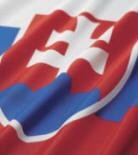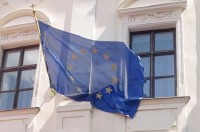Slovakia since 1989
 After the fall of the communist government in 1989, the political and institutional bases of democratic power were formed rapidly, a development confirmed by the elections in 1990 in which the Communist party acquired only 13.3 per cent of the votes. However, the short-lived enthusiasm for freedom was followed by difficult economic, social and state legal crises.
After the fall of the communist government in 1989, the political and institutional bases of democratic power were formed rapidly, a development confirmed by the elections in 1990 in which the Communist party acquired only 13.3 per cent of the votes. However, the short-lived enthusiasm for freedom was followed by difficult economic, social and state legal crises.Tense discussions about the new system of co-existence between Czechs and Slovaks ended in the elections of 1992. The winners agreed on the split of Czechoslovakia, and so, on 1 January 1993, the independent Slovak Republic was established. The new state adopted a democratic constitution, declared itself to be a follower of the positive values of European civilisation, and shortly after its establishment became a member of the United Nations.
The young republic, like other post-socialist countries, had to solve difficult transformation problems. This was even more difficult because by this time the Slovak economy was achieving only 74 per cent of the level of 1989. The government headed by Vladimir Meciar had to build state power, public administration and a foreign service, while trying to solve serious social problems and growing unemployment. In the 1990s, the property nationalised by the Communist regime was restituted and massive privatisation of production facilities took place. Public offices were performed by people with no experience of democracy, some of whom were motivated only by their personal enhancement.
As a result, the privatisation process was not transparent, the crime rate grew, political culture was at an all time low, and political camps and society itself were strongly polarised.
By the turn of the millennium, the new government of Mikuláš Dzurinda proclaimed a return to plural democracy, political communication was stabilised and the country began to implement brave economic, health care and social reforms. The government managed to rehabilitate the banking sector, to implement a unified 19 per cent tax and to create conditions for attracting foreign capital. However it was only mildly successful in combating crime and it underestimated the role of social solidarity. After a series of unpopular measures, it managed to make the economy dynamic.
Today Slovakia is considered the ‘workshop of Europe’ – the most automobiles per capita are produced here. The Slovak economy is healthy at present and enjoys one of the highest growth rates in Europe. The standard of living has also grown, unemployment is decreasing and the government of Robert Fico can fulfil its principles of solidarity.
 These reforms and adherence to the principles of plurality democracy opened the way to the European Union and NATO, both of which Slovakia joined in 2004. At present Slovakia is the second post-socialist country (after Slovenia) that entered the Currency Union. On 1 January 2009 the Slovak crown was replaced by the Euro.
These reforms and adherence to the principles of plurality democracy opened the way to the European Union and NATO, both of which Slovakia joined in 2004. At present Slovakia is the second post-socialist country (after Slovenia) that entered the Currency Union. On 1 January 2009 the Slovak crown was replaced by the Euro.The present social, economic and political situation at the same time creates the space for more peaceful profiling of its own identity in the European context, deeper historical self-reflection and the acquisition of natural self-confidence for Slovak society.
